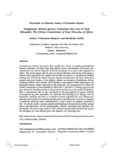Please use this identifier to cite or link to this item:
https://cris.library.msu.ac.zw//handle/11408/1292Full metadata record
| DC Field | Value | Language |
|---|---|---|
| dc.contributor.author | Manyawu, Andrew T. | - |
| dc.contributor.author | Parichi, Mandiedza | - |
| dc.date.accessioned | 2016-05-12T16:40:13Z | - |
| dc.date.available | 2016-05-12T16:40:13Z | - |
| dc.date.issued | 2014 | - |
| dc.identifier.issn | 2312-945X | - |
| dc.identifier.uri | http://hdl.handle.net/11408/1292 | - |
| dc.description.abstract | Contemporary African text genres have mostly been viewed as imitating foundational Western templates such that, other than folkloric genres representative of an exotic pre- colonial past, one cannot truly talk of African text genres as in genres that originated in Africa. This article argues that the wave of African liberation movements of all guises is likely to have engendered new (spoken and written) text genres or significantly modified existing ones but that this impact has gone largely unrecognised in the areas of discourse analysis and genre studies. In the religious domain, an example is Zimbabwean African Instituted Church (AIC) founder Paul Mwazhaís stand against White hegemony in the Methodist Church, which culminated in the production of a foundational text titled The Divine Commission of Paul Mwazha of Africa Part 1 and Part II. Viewing genre as text type, this article identifies and discusses prominent textual cues on the surface of Mwazhaís book to demonstrate that he has contributed to the development of a genre hitherto unrecognised by genre specialists: the Apostolic AIC founding text. Buying into the postmodern thinking that there is no absolute textual originality but only idiosyncratic selection and mixing of pre-existing textual, generic and discursive resources in response to particular rhetorical needs, intertextuality is used to frame the analysis of Mwazhaís text. The article reveals a unique selection and blending of characteristics of other textual genres and discourses, such as autobiography, allegory, apocalypse and Apostolic AIC spirituality. The article argues that it is this creative and unprecedented blend that signals the emergence of a new textual genre, the Apostolic AIC founding text. | en_US |
| dc.language.iso | en | en_US |
| dc.publisher | Midlands State University | en_US |
| dc.relation.ispartofseries | Repositioning the Humanities: Journal of Contemporary Research;Vol. 1, No. 1; p.1-14 | - |
| dc.subject | Genre, African Instituted Churches (AICS) | en_US |
| dc.subject | Founding Text, Discourse, Text, Intertextuality, Interdis | en_US |
| dc.title | Indigenous African generic footprints: the case of Paul Mwazha's The Divine Commission of Paul Mwazha of Africa | en_US |
| dc.type | Article | en_US |
| item.openairetype | Article | - |
| item.cerifentitytype | Publications | - |
| item.grantfulltext | open | - |
| item.fulltext | With Fulltext | - |
| item.openairecristype | http://purl.org/coar/resource_type/c_18cf | - |
| item.languageiso639-1 | en | - |
| Appears in Collections: | Research Papers | |
Files in This Item:
| File | Description | Size | Format | |
|---|---|---|---|---|
| Arts Journal Main Txt.pdf | Full Text | 10.47 MB | Adobe PDF |  View/Open |
Page view(s)
260
checked on Dec 26, 2025
Download(s)
160
checked on Dec 26, 2025
Google ScholarTM
Check
Items in MSUIR are protected by copyright, with all rights reserved, unless otherwise indicated.



